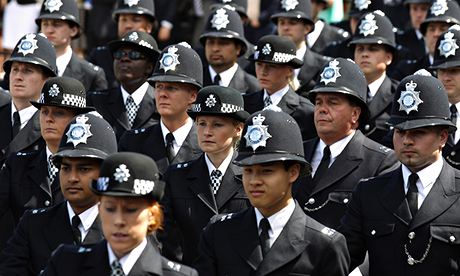Police to wear digital cameras as part of courts efficiency plan

Modernisation of the criminal justice system will give police mobile devices to record interviews and crime scenes
Police officers will be expected to record interviews at crime scenes on mobile devices and deliver filmed evidence online under a digital court initiative announced by the Ministry of Justice on Friday.
The project, aimed at dragging 19th century trial procedures into the 21st century, will cause mounds of legal paperwork to be replaced by laptops and videoscreens in magistrates and crown courts across England and Wales.
Launching the programme at Bromley magistrates court in south-east London, one of the first to be equipped with digital screens, the police and justice minister, Damian Green, pledged to spend £75m a year modernising and improving the efficiency of the criminal justice system.
By July 2016, all criminal courts are due to be operating digitally. The criminal courts system will have its working practices transformed radically. Most likely to be affected is the success rate of domestic abuse cases, traditionally among the most difficult to prosecute but where visual evidence of victims’ injuries is routinely presented at the court.
About 500 Metropolitan police officers, including those in firearm units, are being equipped with body cameras in the first stage of the programme that will eventually be introduced to all forces. Whether every officer will carry a camera as standard issue is not yet clear.
Green said: “We have found cameras [particularly useful] in domestic violence cases. I want to see a criminal justice system where information is captured once by a police officer responding to a crime then flows through the system to the court stage without duplication or reworking.
“Many forces are already using digital technology like body-worn video, which can be used to collect compelling evidence at the scene of crimes.”
The aim is also to speed up justice, with fewer pre-trial hearings, and officers and defendants giving evidence by remote video-links to police stations and prisons.
One of the more ambitious elements, however, is a TrackMyCrime system intended to enable witnesses and victims to get updates on the progress of cases in which they are involved. Maintaining the security of wireless internet links to courts will also provide a challenge.
Stephen Greenhalgh, the deputy mayor of London with responsibility for policing, said the chance to work digitally was enabling officers to cut down on paperwork and remain on patrol for up to an hour and a half longer in each eight-hour shift.
“The average case takes six months [to process through court],” he said. “That’s too long. Body cameras are also a great way for the police to calm things down. One officer told me he would rather get rid of his CS spray than his video camera.”
The not so snappily titled “criminal justice system digital business model” will lead to more guilty pleas by presenting defendants with incontrovertible video evidence at an earlier stage in cases, ministers hope.
Evidence will still have to be directed through the Crown Prosecution Service for decisions on whether charges should be made.
At a recent courtroom demonstration of the system in London, a woman whose hands had been burnt by her partner using a cigarette was shown being interviewed by officers after the crime. Simon Stanier, a prosecutor, said: “It allows police to present what they are seeing at the scene directly to the court.”
Source: theguardian





























